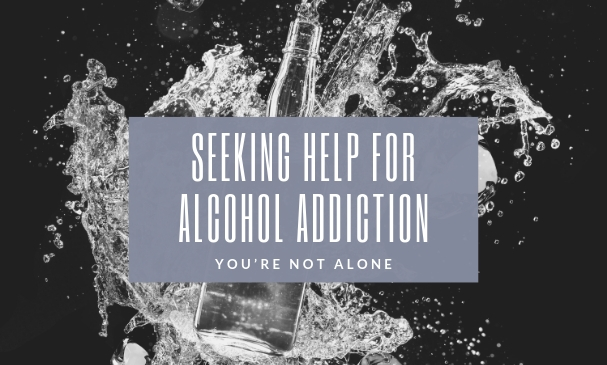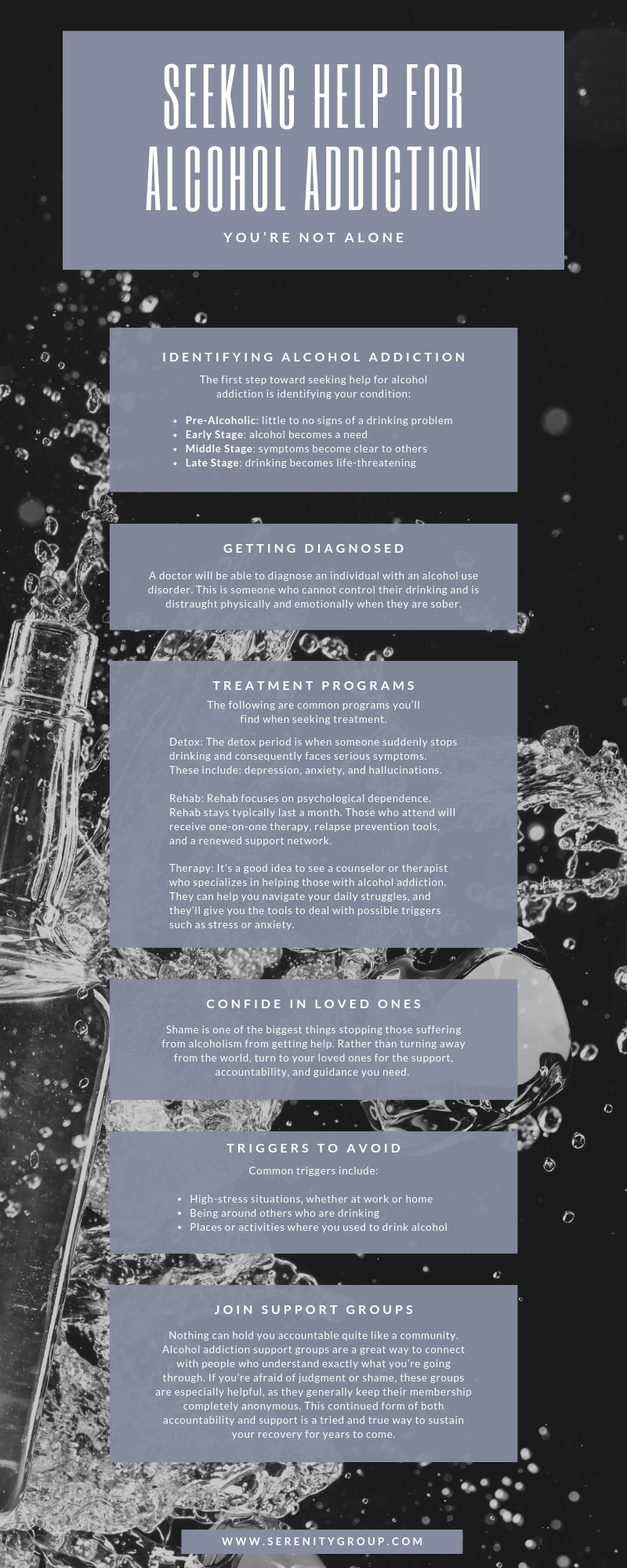Seeking Help for Alcohol Addiction: You’re Not Alone

Untreated alcohol addiction is truly an epidemic—according to Addiction Center, “about 15 million people have an alcohol use disorder, but only about 7% of Americans who are addicted to alcohol ever receive treatment.” No matter the statistics, you don’t have to tackle it alone. There are numerous resources and tools out there for those seeking help for alcohol addiction. While it can be a scary notion, it’s important to take the first steps toward a life free from an alcohol use disorder.
Identifying Alcohol Addiction
The first step toward seeking help for alcohol addiction is identifying your condition. There are many different stages of alcoholism, and no two people will have the same situations or symptoms. Below we outline the general progression of an alcohol use disorder.
Pre-Alcoholic
As denoted by the name, at this stage, there are little to no signs of a drinking problem. Individuals will mostly confine drinking to social situations. However, the issue can develop if the underlying reasons for drinking aren’t healthy. Typically, the person begins to build up tolerance during this stage. As such, they drink with more frequency to alleviate stress, anxiety, or painful memories.
Early Stage
At this point, drinking will become both a need and a source of discomfort for the person. Blacking out will occur at this stage, and they may lie to family and friends about the extent of their drinking. Tolerance will continue to grow, and alcohol will consume a person’s day-to-day thoughts.
Middle Stage
Once someone reaches the middle stage of alcoholism, symptoms will become clear to others. They will begin to miss obligations due to the side effects of drinking. These individuals may even drink during situations such as work or other social obligations. Those afflicted often experience irritability, weight gain, and sluggishness, among other side effects.
Late Stage
For those that are in the late stage of alcoholism, the drinking has become truly life-threatening. Drinking will become a constant activity, occurring from the moment the person first wakes up. Job loss will likely occur before or during this stage. Attempting to stop drinking will often result in tremors or hallucinations; however, detox and rehabilitation can help immensely.
Getting Diagnosed
A doctor will be able to diagnose an individual with an alcohol use disorder. This is someone who cannot control their drinking and is distraught physically and emotionally when they are sober. Once you’re in and talking with a doctor, they can be a huge advocate for ways in which to overcome your alcohol addiction.
Treatment Programs
There is no one way to treat alcoholism—rather, there are several methods to choose from based on the specific person’s needs and condition. Some people utilize a number of these, while others have one treatment program that works for them. The following are common programs you’ll find when seeking treatment.
Detox
While detox alone isn’t a treatment program, it’s the first step for most people who are suffering from alcoholism. The detox period is when someone suddenly stops drinking and consequently faces serious symptoms. These include:
- Depression
- Anxiety
- Shaky hands
- Hallucinations
- Changes in blood pressure and heart rate
The detox period will vary from person to person, possibly lasting over a week. Professionals advise that you go through a program with medical supervision. With the support of specialists, family, and friends, you’ll have the physical and emotional aid you need to get through this trying time.
Rehab
While detox addresses the physical addiction of alcohol, rehab focuses on psychological dependence. Rehab stays typically last a month. Those who attend will receive one-on-one therapy, relapse prevention tools, a renewed support network, and other therapeutic activities. Rehab is all about total wellness, and it can help give you the tools to fight the battle that is an addiction.
Regularly see a therapist
Once you do leave a treatment center, it’s important to keep your wellness in check. It’s a good idea to see a counselor or therapist who specializes in helping those with alcohol addiction. They can help you navigate your daily struggles, and they’ll give you the tools to deal with possible triggers such as stress or anxiety.
Confide in Loved Ones
Shame is one of the biggest things stopping those suffering from alcoholism from getting help. Rather than turning away from the world, turn to your loved ones for the support, accountability, and guidance you need. The most dangerous thing for someone with an addiction is isolation. This can lead to a vicious cycle of turning to alcohol for comfort as opposed to those around them. It’s essential to create a network of support around you, so you have people to turn to when you’re facing dangerous thoughts or behaviors.
Triggers to Avoid
After you’ve received treatment and overcome your alcohol addiction, you’re still likely to experience triggers and temptations. That’s why it’s important to learn how to avoid these triggers and (if they’re unavoidable) how to effectively deal with them. Common triggers include:
- High-stress situations, whether at work or home
- Being around others who are drinking
- Places or activities where you used to drink alcohol
Addiction is entirely personal, and even the most seemingly innocuous of activities or situations can be triggering for those with alcohol addiction. When you simply can’t avoid these situations, utilize the tools a therapist or counselor provides you.
Join Support Groups
Nothing can hold you accountable quite like a community. Alcohol addiction support groups are a great way to connect with people who understand exactly what you’re going through. If you’re afraid of judgment or shame, these groups are especially helpful, as they generally keep their membership completely anonymous. This continued form of both accountability and support is a tried and true way to sustain your recovery for years to come.
Above all else, if you’re struggling with alcohol addiction, know that you’re not alone. There’s an entire world of resources, people, and loved ones looking to support you in your journey toward recovery. If you’re looking to get your life back on track and regain your independence, Serenity Group can help. We offer SR22 insurance in Denver, Chicago, and other locations across the United States. It may be a difficult journey, but in the end, the road to recovery is more than worth it.


Recent Comments